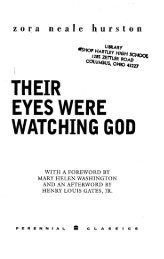- Page 1 and 2: zora neale hurstonLIBRARYErSHOPHART
- Page 3 and 4: To Henry Allen Moe
- Page 5 and 6: ForewordIn 1987, the fiftieth anniv
- Page 7 and 8: Foreword WO, xipoetry and its femal
- Page 9: Foreword II& xiiilevel, the program
- Page 13 and 14: Foreword lig& xviilistening woman f
- Page 15 and 16: 2 412p Zora Neale HurstonSeeing the
- Page 17 and 18: 4 4110 Zora Neale Hurston"Don't min
- Page 19 and 20: 6 Aits Zora Neale Hurston"Sam is ri
- Page 21 and 22: 2Janie saw her life like a great tr
- Page 23 and 24: 10 AN Zora Neale Hurstonbloodhounds
- Page 25 and 26: 12 .6s. Zora Neale HurstonJohnny Ta
- Page 27 and 28: 14 42P Zora Neale Hurstonmama did,
- Page 29 and 30: 16 Aitas Zora Neale Hurston"You kno
- Page 31 and 32: 18 40 Zora Neale Hurstondidn't hit
- Page 33 and 34: 20 42P Zora Neale Hurstonwanted you
- Page 35 and 36: 22 Aija► Zora Neale Hurstonwhere
- Page 37 and 38: 24 4 Zora Neale Hurstonover de fenc
- Page 39 and 40: 4ci•Long before the year was up,
- Page 41 and 42: 28 AP Zora Neale HurstonJanie pumpe
- Page 43 and 44: 30 OP Zora Neale Hurstonlak you oug
- Page 45 and 46: 32 410 Zora Neale Hurstondry up in
- Page 47 and 48: 5On. the train the next day, Joe di
- Page 49 and 50: 36 Alp Zora Neale Hurstondat wife u
- Page 51 and 52: 38 4er Zora Neale Hurstonchance lik
- Page 53 and 54: 40 ASP Zora Neale Hurston"'Bout seb
- Page 55 and 56: 42 Afir Zora Neale Hurstonseen fit
- Page 57 and 58: 44 412P Zora Neale Hurston"I god, A
- Page 59 and 60: 46 aor Zora Neale HurstonAmen was s
- Page 61 and 62:
48 412P Zora Neale Hurstoncould the
- Page 63 and 64:
50 ilas Zora Neale Hurston"Maybe he
- Page 65 and 66:
52 OAP Zora Neale Hurston"Whut fuh,
- Page 67 and 68:
54 ay Zora Neale HurstonHe didn't w
- Page 69 and 70:
56 Zora Neale Hurston"It's uh 1-1-l
- Page 71 and 72:
58 42, Zora Neale HurstonMayor Star
- Page 73 and 74:
60 4 Zora Neale Hurston"Whut you te
- Page 75 and 76:
62 4gP Zora Neale Hurstonbowed, and
- Page 77 and 78:
64 41P Zora Neale Hurston"How you g
- Page 79 and 80:
66 4ip Zora Neale HurstonThe porch
- Page 81 and 82:
68 40 Zora Neale Hurstonvor. Like t
- Page 83 and 84:
70 air Zora Neale Hurstonlove and p
- Page 85 and 86:
72 OAP Zora Neale Hurstonpots and p
- Page 87 and 88:
74 .12P Zora Neale Hurstonwide." Sh
- Page 89 and 90:
The years took all the fight out of
- Page 91 and 92:
78 all► Zora Neale Hurstonhurting
- Page 93 and 94:
80 •, Zora Neale Hurstonwould kee
- Page 95 and 96:
82 4ip Zora Neale Hurstonbeen scorn
- Page 97 and 98:
84 O'n Zora Neale HurstonSo Janie b
- Page 99 and 100:
86 4110, Zora Neale Hurston"Too lat
- Page 101 and 102:
9Joe's funeral was the finest thing
- Page 103 and 104:
90 412s Zora Neale HurstonMost huma
- Page 105 and 106:
92 .12P Zora Neale HurstonJoe and t
- Page 107 and 108:
1 0One day Hezekiah asked offfrom w
- Page 109 and 110:
96 41. Zora Neale Hurstonglowing in
- Page 111 and 112:
98 4 ► Zora Neale HurstonHe turne
- Page 113 and 114:
1 1Janie wanted to ask Hezekiah abo
- Page 115 and 116:
102 alis Zora Neale Hurstonnothing.
- Page 117 and 118:
104 40s Zora Neale Hurston"Umph! um
- Page 119 and 120:
106 41, Zora Neale HurstonAh'm born
- Page 121 and 122:
108 4. Zora Neale HurstonIn the coo
- Page 123 and 124:
12It was after the picnic that the
- Page 125 and 126:
112 Ards Zora Neale Hurston"Aw mah
- Page 127 and 128:
114 412P Zora Neale Hurston"'Cause
- Page 129 and 130:
13Jacksonville. Tea Cake's letter h
- Page 131 and 132:
118 41P Zora Neale Hurstonroom with
- Page 133 and 134:
120 42P Zora Neale Hurstonup around
- Page 135 and 136:
122 4p Zora Neale Hurston"One thing
- Page 137 and 138:
124 ais Zora Neale HurstonJust befo
- Page 139 and 140:
126 41. Zora Neale Hurstoncriticize
- Page 141 and 142:
128 4pr Zora Neale Hurston"Put dat
- Page 143 and 144:
130 ar Zora Neale Hurstonalways git
- Page 145 and 146:
132 41, Zora Neale HurstonFinally n
- Page 147 and 148:
134 4 Zora Neale HurstonSometimes J
- Page 149 and 150:
15Janie learned what it felt like t
- Page 151 and 152:
138 Air Zora Neale Hurstonher until
- Page 153 and 154:
140 40 Zora Neale Hurstonironing bo
- Page 155 and 156:
142 412P Zora Neale Hurstonnothin'
- Page 157 and 158:
144 4 Zora Neale Hurstonabout him t
- Page 159 and 160:
146 4ip Zora Neale Hurstonjust gave
- Page 161 and 162:
148 4 Zora Neale Hurstonmark on 'em
- Page 163 and 164:
150 ap Zora Neale Hurstononce in uh
- Page 165 and 166:
152 as Zora Neale Hurstonknew she w
- Page 167 and 168:
18Since Tea Cake and Janie had frie
- Page 169 and 170:
156 4 ► Zora Neale Hurston"Thank
- Page 171 and 172:
158 40 Zora Neale Hurstonweather wa
- Page 173 and 174:
160 412p Zora Neale HurstonJanie, y
- Page 175 and 176:
162 afts Zora Neale Hurstonforward
- Page 177 and 178:
164 dap Zora Neale Hurston"Tea Cake
- Page 179 and 180:
166 ais Zora Neale HurstonJanie ach
- Page 181 and 182:
19And then again Him-with-the-squar
- Page 183 and 184:
170 40 Zora Neale Hurston"Dat's whu
- Page 185 and 186:
172 ap Zora Neale Hurston"Where us
- Page 187 and 188:
174 40 Zora Neale Hurston"Ah though
- Page 189 and 190:
176 as Zora Neale Hurston"Ah, naw T
- Page 191 and 192:
178492p Zora Neale Hurstonhis condi
- Page 193 and 194:
180 dap Zora Neale Hurstonbrother w
- Page 195 and 196:
182 412p Zora Neale Hurstonhouse 't
- Page 197 and 198:
184 alls Zora Neale Hurston"Tea Cak
- Page 199 and 200:
186 ihr Zora Neale Hurstonand loade
- Page 201 and 202:
188 40 Zora Neale Hurstonlawyer and
- Page 203 and 204:
20id&Because they really loved Jani
- Page 205 and 206:
192 42s Zora Neale Hurston"Lawd!" P
- Page 208 and 209:
AfterwordVirnZora Neale Hurston:"A
- Page 210 and 211:
Afterword ir' 197black fiction. Thi
- Page 212 and 213:
Afterword V& 199How could the recip
- Page 214 and 215:
Afterword 201Rereading Hurston, I a
- Page 216 and 217:
Afterword ID, 203and language, lang
- Page 218:
Afterword Igt• 205our choices eve
- Page 221 and 222:
208 as Selected BibliographyWORKS A
- Page 223 and 224:
210 As Selected BibliographyRayson,
- Page 225 and 226:
212 40 ChronologyDecember 1924 Publ
- Page 227 and 228:
214 arip ChronologyFebruary 1931 Br
- Page 229 and 230:
216 lip ChronologyApril 1938 Joins
- Page 231 and 232:
218 411, Chronology1947 Publishes a



